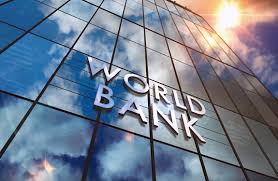
According to a world bank report released Wednesday, economic growth of 3.3 per cent for 2021 and 3.5 per cent for 2022 has been predicted for Sub-Saharan Africa which would be driven by rising commodity prices, the relaxation of some of the Covid-19 restrictions, and growth in global trade.
The growth for the region for 2023 has been predicted at 3.8 per cent by the World Bank.
Sub-Saharan Africa, like the rest of the world, imposed movement restrictions in the first quarter of last year to limit the spread of the Covid-19 pandemic, stifling trade and other crucial economic activities such as tourism and transportation.
The growth of the region can be as high as 5.1 per cent in 2022 and 5.4 per cent in the following year if the speed of roll out of Covid-19 vaccines was high, while a slow rollout can reduce growth, according to the World Bank report.
"Slower vaccine delivery and coverage would impede the relaxation of COVID-19 disruptions in economic activity and project growth to slow down to 2.4% in 2023," the bank's Africa's Pulse report said.
The most recent Africa's Pulse report, released in April, predicted growth of 2.3 per cent -3.4 per cent this year, following a 2.0 per cent contraction in 2020.
The rate of vaccination in Africa has been slow even while many of the developed countries have been able to restart their economies in a phased manner because of higher rates of inoculation against eth pandemic. There are also fears of cycles of on-off lockdowns could be faced by African countries because of the threats faced by the variants of the coronavirus such as Delta.
According to reports, a total of 8.45 million Covid-19 infections and 212,000 deaths have been reported in Africa as of Wednesday.
Only half of the 52 countries that had gained access to Covid-19 vaccines have been able to completely vaccinate only 2 per cent of their adult population at the end of September, according to WHO Africa.
According to the World Bank, the economies of Angola, Nigeria, and South Africa are expected to emerge from the recession this year.
After five years of recession, oil-producing Angola is expected to grow by 0.4 percent in 2021, according to the report.
Nigeria's growth was expected to be 2.4 per cent, driven by services, while South Africa - Africa's most industrialized economy - was expected to grow by 4.6 per cent, owing to improved performance in services, industry, and agriculture.
Non-resource-rich countries are also expected to rebound strongly, with the Ivory Coast's economy expanding 6.2 per cent and Kenya's expanding 5.0 per cent this year, according to the bank.
The average general government gross debt is projected to be at 71 per cent of GDP in 2021, which would be 30 percentage points higher than in 2013, which shows that public debt in Sub-Saharan Africa had increased during the pandemic, the report said.
"Increased funding on commercial terms, partially reflecting the recent surge in Eurobond issuances, has raised the exposure of sub-Saharan African countries to interest rate, exchange rate, and rollover risks," World Bank said.
(Source:www.reuters.com)
The growth for the region for 2023 has been predicted at 3.8 per cent by the World Bank.
Sub-Saharan Africa, like the rest of the world, imposed movement restrictions in the first quarter of last year to limit the spread of the Covid-19 pandemic, stifling trade and other crucial economic activities such as tourism and transportation.
The growth of the region can be as high as 5.1 per cent in 2022 and 5.4 per cent in the following year if the speed of roll out of Covid-19 vaccines was high, while a slow rollout can reduce growth, according to the World Bank report.
"Slower vaccine delivery and coverage would impede the relaxation of COVID-19 disruptions in economic activity and project growth to slow down to 2.4% in 2023," the bank's Africa's Pulse report said.
The most recent Africa's Pulse report, released in April, predicted growth of 2.3 per cent -3.4 per cent this year, following a 2.0 per cent contraction in 2020.
The rate of vaccination in Africa has been slow even while many of the developed countries have been able to restart their economies in a phased manner because of higher rates of inoculation against eth pandemic. There are also fears of cycles of on-off lockdowns could be faced by African countries because of the threats faced by the variants of the coronavirus such as Delta.
According to reports, a total of 8.45 million Covid-19 infections and 212,000 deaths have been reported in Africa as of Wednesday.
Only half of the 52 countries that had gained access to Covid-19 vaccines have been able to completely vaccinate only 2 per cent of their adult population at the end of September, according to WHO Africa.
According to the World Bank, the economies of Angola, Nigeria, and South Africa are expected to emerge from the recession this year.
After five years of recession, oil-producing Angola is expected to grow by 0.4 percent in 2021, according to the report.
Nigeria's growth was expected to be 2.4 per cent, driven by services, while South Africa - Africa's most industrialized economy - was expected to grow by 4.6 per cent, owing to improved performance in services, industry, and agriculture.
Non-resource-rich countries are also expected to rebound strongly, with the Ivory Coast's economy expanding 6.2 per cent and Kenya's expanding 5.0 per cent this year, according to the bank.
The average general government gross debt is projected to be at 71 per cent of GDP in 2021, which would be 30 percentage points higher than in 2013, which shows that public debt in Sub-Saharan Africa had increased during the pandemic, the report said.
"Increased funding on commercial terms, partially reflecting the recent surge in Eurobond issuances, has raised the exposure of sub-Saharan African countries to interest rate, exchange rate, and rollover risks," World Bank said.
(Source:www.reuters.com)





